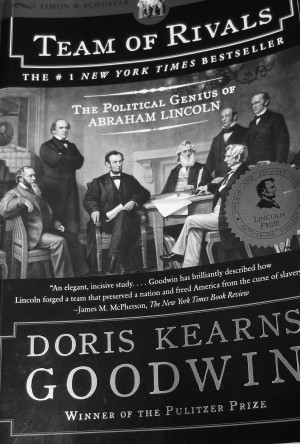Team of Rivals by Doris Kearns Goodwin (2005. Simon and Schuster. ISBN 978-0-7432-7075-5)
Monumental. Poetic. Well-seasoned. These descriptions apply both to the subject matter of this phenomenal character study as well as to the underlying character himself. Abraham Lincoln is, without a doubt, the most lamented, most eulogized, most beloved president in United States history. Even those who grew up south of the Mason-Dixon Line understand this truth about Lincoln: He was a conciliator; the man willing to allow the wounds of a horrific breach within the fabric of this nation to heal without exacting “pounds of flesh” from Jefferson Davis, Robert E. Lee and the other leaders of the rebellion. When John Wilkes Booth assassinated Lincoln at the close of the Civil War, Booth placed his beloved South in the most precarious of positions: He eliminated the one man in the North who bore absolutely no animus or hatred towards the rebels. But, because of Lincoln’s calm, steady, unyielding hand on the tiller during the war, a calmness which overshadowed the dark and dangerous days of the rebellion, those who remained behind, including the largely inept and ineffectual Andrew Johnson, refrained from reversing course and seeking retributiont. Wading into Goodwin’s prose, you come to appreciate the steadfastness of Lincoln’s personality in the face of overwhelming tragedy, both personal and collective.
It isn’t often when a biography of someone like Lincoln, whose life has been reviewed extensively in print and film for the better part of the past century, takes the country by storm. Why?
The answer to the success of Goodwin’s effort, I think, is two fold. First, she is a tremendously gifted writer who has an uncanny ability to take historical material and disguise it as great art. That’s not a slam; it’s a compliment. The book, which weighs in at over 700 pages and concentrates heavily on Lincoln’s presidency (though the background of his early life is there as well) is a quick read because the language choices the author makes bring the material zest, breath, and heart.
The second reason I believe this book touches a nerve with anyone with a bone of history or politics in their lineage (and I have plenty of both in mine!) is that the contrast between today’s political landscape and the most tumultuous period of American history cannot be starker in terms of how men (for in Lincoln’s day, politics was indeed a man’s domain) put aside their personal animosity and petty politics to work for the preservation of the nation. Oh, they weren’t perfect, back in Lincoln’s time. Salmon Chase, the Secretary of the Treasury undercut and campaigned against Lincoln as a potential Republican rival even after Lincoln bested him for the nomination and brought him to Washington to serve in the cabinet. And there were others who heeded the president’s call to service who didn’t always follow Lincoln’s line. But they did, both Republican rivals and Democratic challengers, accept their nation’s call to serve a president many of them viewed, at the outset, as little more than a rail-splitting character from a comedic stage play. Contrast that willingness to place personal ambition on hold for the greater good with what we see today out of our leaders in Washington. So far as I am able to recall, President Obama’s singular Republican appointment of note was John Huntsman, whose own attempt to become the Republican nominee this year fell far short. Though Huntsman had other problems (perhaps two Mormons in the race on the Republican side is one too many?), his loyalty to country, by accepting Obama’s invitation, likely didn’t help him amongst the faithful. This, I think, is the greatest lesson that can be drawn from Goodwin’s work: While there is no question that Abraham Lincoln and his team of rivals possessed egos that would challenge those of our present national leaders, they were willing and able, for the good of a nation, to set their pride aside and work to end a rebellion. I am struck by how much Goodwin’s discussion of the conciliatory facet of Lincoln’s personality (even after Chase went behind Lincoln’s back for the 1864 nomination and was asked to resign, Lincoln brought him back into the fold as the Chief Justice of the U.S. Supreme Court) mirrors the personality of that little known, and sadly, quickly forgotten Minnesotan, State Rep. Willard Munger.
Now, let me say this plainly: In my biography of my uncle’s life, Mr. Environment: The Willard Munger Story, I in no way liken Willard to our 16th president in terms of intellect, speaking ability, or the poetic content of his speeches. That would be absurd. But there is this: Willard was, in circumstance after circumstance, able to garner support for his cutting-edge environmental legislation from conservatives. Why? Because, like Lincoln,Willard understood the motivations behind those he served with. He knew the hearts of the men and women he worked with in the Minnesota Legislature like his own. And, sadly, as you read through Willard’s story, you will witness, over the decades of his career, the slow erosion of the civility and dignity displayed by our leadership in Minnesota that, like what we are now left to consider on a national scale, has essentially derailed our Republic. Nowhere in Willard’s life or Lincoln’s vast experience did either man hold a grudge so long or so fervent that he would not walk across the aisle, shake hands, and attempt to begin anew. Goodwin, in her telling of history, is subtly hinting that there are better ways to run a nation than petty name calling and deep-seated resentment against men and women who don’t agree with your position on an issue.
I wonder if anyone in Washington has actually read and understands this book.
When a biography, where you know the ending like the palm of your hand, has you in tears at the president’s bedside, I’d say the author has hit the mark.
5 stars out of 5.
Mark



